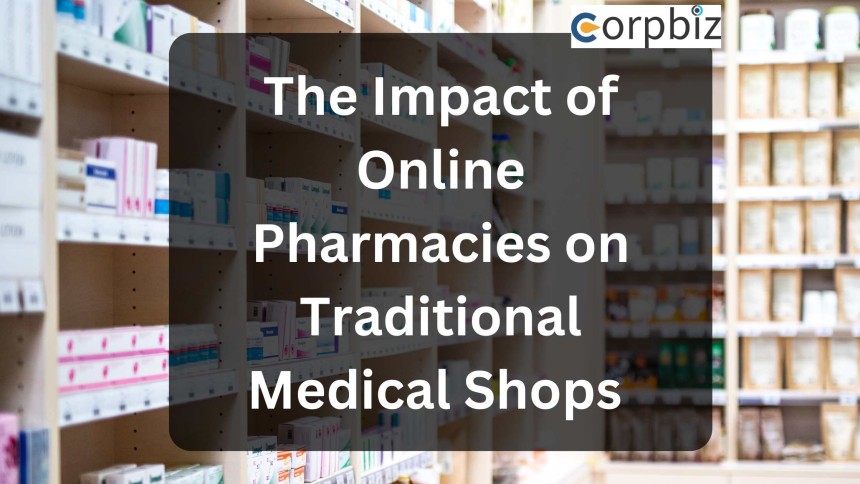The Impact of Online Pharmacies on Traditional Medical Shops
This blog explores the rise of online pharmacies, their effects on traditional medical shops, and the importance of licenses
The Rise of Online Pharmacies

In recent years, online pharmacies have grown rapidly, providing convenience to customers by delivering medicines right to their doorsteps. While this shift has benefited many, it has significantly impacted traditional medical shops. This blog explores the rise of online pharmacies, their effects on traditional medical shops, and the importance of licenses, such as manufacturing drug licenses, retail drug licenses, and wholesale drug licenses, for ensuring the safe and legal distribution of medicines.
The Rise of Online Pharmacies
Online pharmacies are platforms where customers can order medicines through websites or apps. These platforms offer:
- Convenience: Customers can purchase medicines from the comfort of their homes.
- Wider Choices: Online pharmacies often have access to a larger inventory, including rare or specialized drugs.
- Discounts: Many online pharmacies offer attractive discounts, making medicines more affordable.
- Accessibility: For people in remote areas or those unable to visit physical stores, online pharmacies can be a lifesaver.
However, this convenience has created challenges for traditional medical shops, which have been a cornerstone of healthcare in communities for decades.
Challenges Faced by Traditional Medical Shops
Competition with Lower Prices
Online pharmacies often provide significant discounts on medicines. This is possible because of their bulk purchasing power and lower operational costs. Traditional shops struggle to match these prices, leading to a loss of customers.
Convenience Factor
Many people prefer the ease of ordering medicines online rather than visiting a shop. This change in consumer behavior has reduced foot traffic in traditional stores.
Limited Stock
While online pharmacies usually have vast inventories, traditional shops often face challenges in maintaining a wide variety of medicines due to space constraints and inventory costs.
Technological Gap
Traditional medical shops often lack the technological infrastructure to compete with online platforms. This includes digital payment options, inventory management systems, and customer engagement tools.
Licensing and Compliance Costs
Operating a medical shop requires various licenses and adherence to strict regulations. Competing with online platforms, which sometimes operate in a legally grey area, becomes even more challenging.
The Importance of Drug Licenses
To ensure the safe and legal distribution of medicines, all medical entities, including traditional shops and online pharmacies, must comply with licensing requirements. Here’s a breakdown of the critical drug licenses:
1. Manufacturing Drug License
- Manufacturing Drug License is Required for entities involved in producing drugs and medicines.
- Ensures that medicines are manufactured under strict quality standards.
- Issued by the state drug control authorities under the Drugs and Cosmetics Act, 1940.
2. Retail Drug License
- Retail Drug License is Necessary for pharmacies and medical shops selling medicines directly to customers.
- Ensures that only qualified pharmacists dispense medicines.
- Helps regulate the sale of prescription drugs, avoiding misuse.
3. Wholesale Drug License
- Wholesale Drug License is Required for businesses that sell medicines in bulk to retailers or hospitals.
- Ensures proper storage and distribution practices.
Obtaining and maintaining these licenses is crucial for both online and traditional setups. Any lapse in compliance can lead to severe penalties, including license suspension or cancellation.
How Traditional Medical Shops Can Adapt
Despite the challenges posed by online pharmacies, traditional medical shops can adapt and thrive by embracing change and focusing on their unique strengths.
Leverage Local Trust
Traditional shops are often more trusted by local communities. Building strong relationships with customers through personalized service can give them an edge over faceless online platforms.
Focus on Immediate Availability
Online pharmacies typically have a delivery time of at least a few hours or days. Traditional shops can focus on providing instant availability for urgent needs.
- Embrace Technology
- Set up digital payment options.
- Use inventory management software to avoid stockouts.
- Consider launching a website or mobile app to enable online orders.
- Offer Additional Services
- Provide health consultations or advice through qualified pharmacists.
- Partner with local doctors for referrals.
- Stock over-the-counter products like health supplements and wellness items.
- Stay Compliant
Ensure all necessary licenses are up to date. Highlight your adherence to safety and regulatory standards to build customer trust.
Collaboration Between Online and Traditional Pharmacies
Rather than viewing online pharmacies as competitors, traditional medical shops can explore collaboration opportunities:
- Hybrid Models: Many traditional shops are launching online platforms to cater to tech-savvy customers while maintaining their physical presence.
- Partnerships: Collaborating with online platforms for last-mile delivery services can help reach a wider audience.
Government Role and Regulations
The government plays a vital role in ensuring fair competition and protecting public health. Recent steps include:
- Draft Rules for Online Pharmacies: These aim to regulate the sale of medicines online, ensuring safety and quality.
- Support for Traditional Shops: Initiatives like digital literacy programs can help traditional shop owners adopt new technologies.
Conclusion
The rise of online pharmacies has undoubtedly impacted traditional medical shops, but it also presents an opportunity for growth and innovation. By embracing technology, focusing on community trust, and staying compliant with licensing requirements such as manufacturing drug licenses, retail drug licenses, and wholesale drug licenses, traditional medical shops can remain relevant and competitive in the evolving healthcare landscape.
The future of medicine distribution is likely to involve a blend of online convenience and the personal touch of traditional shops, creating a balanced ecosystem that benefits all stakeholders.




